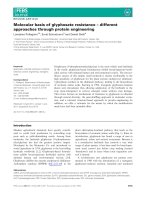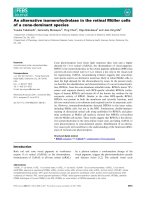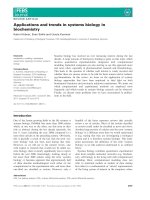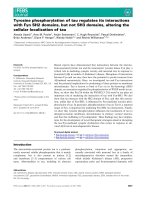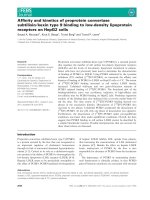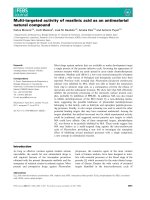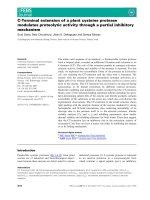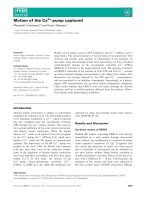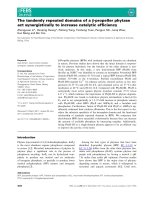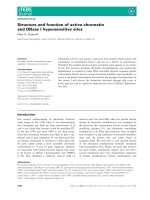Tài liệu Báo cáo khoa học: Malaria)the global disease docx
Bạn đang xem bản rút gọn của tài liệu. Xem và tải ngay bản đầy đủ của tài liệu tại đây (434.13 KB, 1 trang )
MINIREVIEW SERIES
Malaria
)
the global disease
Renu Tuteja
Malaria Group, International Centre for Genetic Engineering and Biotechnology, New Delhi, India
Malaria is a disease of global concern. Historically,
malaria has killed more people than any other infec-
tious disease and still accounts for massive levels of
mortality and morbidity in over 100 countries of the
world. In Africa and some other underdeveloped coun-
tries mortality remains high because there is limited
access to treatment in villages. Malaria parasites
spread by successively infecting two types of hosts:
humans and female Anopheles mosquitoes. Four
species of malaria parasite can infect humans under
natural conditions: Plasmodium falciparum, Plasmo-
dium vivax, Plasmodium ovale and Plasmodium mala-
riae. The first two cause the most infections
worldwide. In humans, the parasites grow and multiply
first in the liver cells and then in the erythrocytes.
Blood-stage parasites are responsible for causing the
symptoms of malaria, and the disease is diagnosed by
its symptoms and the microscopic examination of
blood. Malaria is completely curable but the emer-
gence of drug-resistance in P. falciparum is a major
obstacle to the control of the disease. Insecticide resis-
tance in disease-transmitting mosquitoes makes it vital
to understand the molecular background of the patho-
genesis of malaria in order to facilitate the develop-
ment of novel approaches to combat the disease.
This minireview series provides an overview of the
disease, the progress towards vaccine development, the
problem of drug resistance and the development of
one of the novel drug targets. The first minireview is
an overview in which the author describes the various
parasites, and the life cycle and development of P. falci-
parum in red blood cells. Malaria symptoms, the
genome, proteome and transcriptome information of
P. falciparum are described in brief.
The second minireview is an update on vaccine
development against this devastating disease. The dis-
covery and development of malaria vaccines follow
two principal strategies. Most subunit vaccines are
designed to mimic naturally acquired immunity that
develops over years upon continuous exposure to Plas-
modium transmission. Experimental model vaccines,
such as attenuated live parasites and transmission-
blocking antigens, induce immune responses that are
superior to naturally acquired immunity. The promises
and obstacles of the different approaches towards an
effective and affordable vaccine are discussed.
The third minireview gives an insight into the prob-
lem of drug resistance in the parasite. The financial
burden of controlling malaria in Africa is immense,
estimated to be upwards of $12 billion annually. Rela-
tively few drugs are available to combat malaria, and
widespread resistance to the most economically accessi-
ble of these drugs is a major obstacle. This review
summarizes the current status of research into resis-
tance to the major antimalarial drugs, including anti-
folates, chloroquine and its relatives, and the powerful
new artemisinin derivatives.
The final minireview provides strategies towards the
development of a novel drug target against this para-
site. Helicases are important molecular motor proteins,
which couple the hydrolysis of nucleic acid triphosphate
to nucleic acid unwinding. These enzymes are required
for all nucleic acid transactions in the malaria parasite
and can therefore serve as attractive drug targets.
Renu Tuteja is currently Staff Research Scientist at the International Centre for Genetic Engineering and Biotech-
nology (ICGEB), New Delhi, India. After postdoctoral research at NIH (Bethesda, MD) and UCLA (Los Angeles,
CA) she held a faculty position at ICGEB (Trieste, Italy). She has carried out pioneering work on helicases from dif-
ferent systems, including malarial parasites. Recently, she reported the isolation, from the malaria parasite, of a
signal peptidase and a novel bipolar, schizont-stage-specific helicase regulated by phosphorylation. Her current
research interests are the characterization of important enzymes of P. falciparum and their role in parasite biology.
doi: 10.1111/j.1742-4658.2007.05996.x
FEBS Journal 274 (2007) 4669 ª 2007 The Author Journal compilation ª 2007 FEBS 4669
